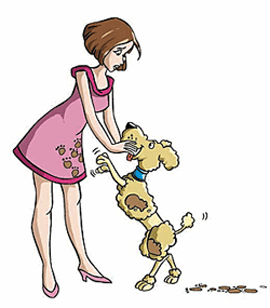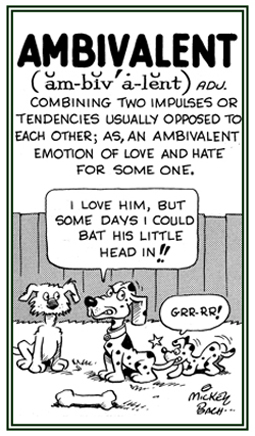ambi-, amb-, ambo-
(Latin: both, on both sides; around, about; vague; obscure)
2. Etymology: from Latin ambiguus, "moving from side to side, of a doubtful nature", from ambigere, "to go about, wander, doubt"; from ambi-, "around, about, on both sides" + agere, "to drive, to move".
A person's ambiopia can be one of the first signs of a systemic disease; especially, a muscular or neurological process which may disrupt a person’s balance, movements, and/or reading abilities.
2. The status of using either eye alone at a given time: In order to avoid the simultaneous perception of two images of a single object, some people can use either the left or the right eye for each occasion.2. A reference to someone who is clumsy, awkward, or being unskillful in the use of both hands with the same bad results: The little child presented in the picture below is certainly an ambisinister one because he has difficulties getting the food into his mouth without spilling it all over himself.
3. Etymology: from Latin ambi-, "both", + sinister, "on the left side".

2. A sphere or scope of something which acts or performs: A piano has a greater ambit of sounds for an audience than an acoustic guitar.
3. Etymology: from Latin ambitus, which came from ambire, "to go around".
2. The object, state, goal, or result aspired or sought after: To be a professional baseball player has been Jim's life-time ambition.
3. A need or urge for an activity: Jerry and Jane have no ambition to go dancing this evening; so, they are staying home.
Word History
Even in ancient Rome candidates for public office went around soliciting votes. This activity was indicated by the word ambitio, "a going about, going around".
Ambitio was derived from ambire, "to go about", which in turn was formed from amb-, "about", and ire, "to go". Since this activity indicated a desire for honor or power, the word ambitio came to mean the desire for official honors.
This word was borrowed in French and English as ambition, and its meaning broadened to denote the earnest desire for achievement.
2. A reference to an aim or objective that someone is trying to attain or to accomplish: The teacher, Mr. Evans, told his classes that ambitious students make the best grades

The scheme, or master plan, of the kingdom of Saudi Arabia to build five new cities gives the term ambitious a new meaning.
2. The presence of two opposing ideas, attitudes, or emotions at the same time: Matthew has an ambivalence regarding where he should invest his money for his retirement.
3. A feeling of uncertainty about something because of a mental conflict: James was having an ambivalence about when he should have his hip operation because the doctor told him that he should try non-invasive treatments first.

Oh, Honeycup! How could my baby get so dirty!?
Stay down, you dirty dog! Don't jump on me!
When it comes to responding to the dog, the woman obviously has two ways of dealing with it.
Mary had been ambivalent about getting married during her early years; now, since she is thirty, she is eager to accept Leslie's proposal of marriage.
2. Relating to the uncertainty as to what course to follow; conveying an indecision: The senator had an ambivalent feeling about which way he would vote on the new bill.


